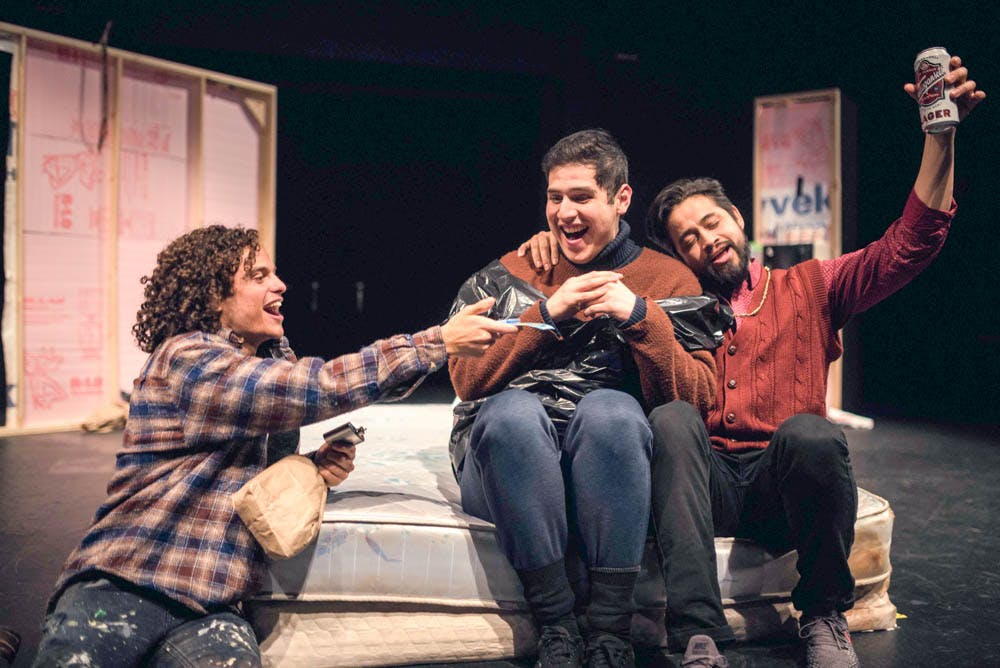Not every night at the theatre begins with a warning that the script may have been edited within the last hour, that the actors may ask for their lines and that the whole production may experience such technical difficulties that an inadvertent intermission may be required.
But all of this is part of the experience of Writing is Live, an annual festival that occurred last Friday through Sunday in which University graduate student playwrights work with their peers and professors to stage their developing plays.
The festival took place in Leeds Theatre and showcased the work of the four students currently enrolled in the MFA playwriting program. Each play had been written the previous semester with the help of professors and other advisors. For the festival, they were directed and performed in a collaborative effort with theatre students in the Brown/Trinity MFA Program as well as University undergraduates. Although the plays were still in the workshop stage, they took the form of full-fledged productions.
Following the performance of her play, “Mary Gets Hers,” playwright Emma Horwitz GS described the festival as having two core focuses — process and discovery. “Its main thesis is process,” Horwitz said, adding that “so much of theatre is figuring out how to make the thing that you’re making, not just making the thing.”
Horwitz said that this year, discovering how to collaborate effectively was central to her experience. To do this well, she asserted that a playwright must be “communicative with the people that are in your project and the people that are in conversation with your project,” which includes the audience itself.
Lisa D’Amour, interim director of playwriting and visiting assistant professor at the University, agrees that the audience plays a special role in Writing is Live. D’Amour taught a class for the four playwrights and advised them on their scripts.
“We tried to set the stage that these audience members were really coming into a lab or coming into a rehearsal,” she said. D’Amour added that part of the benefit of the workshop performances in Writing is Live is that playwrights can benefit from watching audiences react to their work. “You just don’t know what it is until you start understanding how the tension of the play is held in the audience,” D’Amour said, adding “You want to see where people are paying attention.”
The work of Julia Izumi GS exemplifies how the collaborative process can be borne out in a play. Izumi continued to edit her play, “Akira Kurosawa Explains His Movies and Yogurt (with live & active cultures!),” until shortly before the performance. She allowed the actors some free rein, with a few even writing parts of their own scripts.
“That’s what’s great about this festival,” Izumi said. “You can use it to experiment with something you’ve always wanted to experiment with.”
In many scenes, actors addressed the audience directly. “I think the fourth wall has its purpose, but I would much rather take it down than leave it up,” Izumi said, noting that plays can “engage with an audience” in a way that art forms like film cannot. “I’m always really conscious of trying to make sure that the audience has a relationship with the piece that they’re seeing,” Izumi said. In some scenes, audience members of the play participated passively by watching the show; in others, they actively responded to actors’ scripted questions.
Lucas Baisch GS wrote a piece titled “import speech memory” and spoke about how the process of putting a play before an audience is not always easy. “There are definitely times that it’s terrifying; it can be an emotional process in which you’re letting something go,” Baisch said of moving a play from writing to performance. “But it can also be an exercise in translation,” he added, referring to the number of different art forms involved in producing for the stage.
He also spoke to a sentiment common to the work of all four members of the MFA playwriting program, a question at the heart of their study: “How does theatre become a site for pivoting, pivoting an audience?” He continued, “I think there’s the inclination to look away, and making people look at a thing is really important.”
Horwitz agreed, and she took up Baisch’s point that a play can draw attention to that which often goes unseen. In the best cases, she said, theatre inspires an audience to “look at the world in a new way: through the lens of the play, through the lens of a character, through the lens of a design element.”





